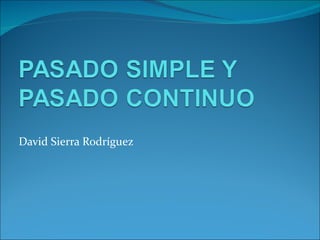Pasado simple y pasado continuo
•Transferir como PPT, PDF•
2 gostaram•24,231 visualizações
Denunciar
Compartilhar
Denunciar
Compartilhar

Recomendados
Mais conteúdo relacionado
Mais procurados
Mais procurados (20)
Semelhante a Pasado simple y pasado continuo
Semelhante a Pasado simple y pasado continuo (20)
Mais de David Sierra
Mais de David Sierra (7)
John lennon david sierra, diego montes, francisco blázquez

John lennon david sierra, diego montes, francisco blázquez
Pasado simple y pasado continuo
- 2. ÍNDICE
- 5. Los verbos regulares lo forman añadiendo -ed a la forma base: “We played in the park yerterday”
- 6. Reglas ortográficas Forma base Pasado simple Acaba en e muda añade d live lived 1 sílaba acabada en vocal + consonante dobla consonante Stop Rob Stopped Robbed Acaba en consonante + y se cambia y por i Carry Study Carried Studied Acaba en l , se dobla esta Travel Travelled 2 sílabas acentuada la última, se dobla la consonante final Prefer Permit Prefered Permited
- 7. En negativa tanto los regulares como los irregulares necesitan dind´t: “We didn´t play on the computer” En interrogativa se pone did delante del sujeto: “Did you watch the show ?”
- 8. EXPRESIONES TEMPORALES yerterday (ayer) last night (anoche) at + una hora on + un dia o una fecha in + un año o un siglo ago (ace)
- 9. PASADO CONTINUO USOS DEL PASADO CONTINUO Expresar lo que estaba ocurriendo en el pasado: “ At 9 o´clock last night, we were having dinner” Describir dos o mas acciones prolongadas y simultáneas en el pasado, unidas por while o as: “ He was listening to music while/as I was reading”
- 12. Who y what se usan para preguntar por el sujeto, hacen de sujeto: “ Who cooks your lunch?” Si hacen de complemento, el orden es el de una interrogativa normal: “ What do you mean?” El verbo rige una preposición ésta se pone al final: “ Who have you been with?”